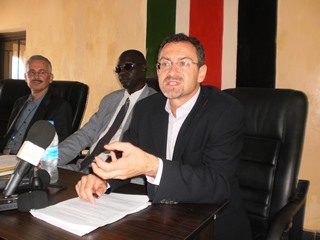Aid agencies unveil plan to reach 3.8 million people in S. Sudan
June 14, 2014 (JUBA) – A new plan to assist 3.8 million people hit by hunger, violence and diseases in South Sudan by December was on Saturday unveiled by aid agencies in the country.

“Now that the rains have set in, conditions in South Sudan are deteriorating by the day: people are literally living in mud. Cholera has broken out, malaria is rampant and many children are malnourished. Millions of people need emergency healthcare, food, clean water, proper sanitation and shelter to make it through the year,” Toby Lanzer, the United Nations humanitarian coordinator in South Sudan told reporters in the capital, Juba.
“We have three main goals: to save lives, prevent a famine, and avert the loss of a generation of children and young people to this conflict. Aid organizations have reached 1.9 million people so far. With sufficient resources, we will be able to do much more,” he added.
Last month, at least $600 million was pledged by donors at a conference organised to raise funds for South Sudan’s humanitarian crisis in Oslo, Norway.
Meanwhile of the $1.8 billion required to implement the 2014 South Sudan Crisis Response Plan, some $740 million has reportedly been mobilised already.
Lanzer said this leaves a gap of just over $1 billion or only $1.50 per day for each person to be assisted. He further expressed concerns over the low funding levels for nutrition and protection programmes and that this could have grave consequences on the population.
Over 50,000 children, agencies say, could die this year if they do not get assistance.
On a positive, however, relief organisations welcomed the commitment by the warring in the conflict to the peace process, despite the fact that much damage was already done.
“Even if the cessation of hostilities holds – and I sincerely hope it will – fighting and displacement has already shattered the lives of millions of people”, said Lanzer.
“The commitment of NGOs and UN agencies to the people of South Sudan is steadfast and resolute, but we need two things to do our work. First, the high-level commitment of both parties to full access for aid workers must be implemented on the ground. Second, relief agencies need more money”, he observed, adding that “With those things in place, we will deliver.”
Oxfam South Sudan country director, Jane Drew equally expressed concerns over the country’s six-month old conflict.
“Today marks six months since the onset of the crisis that stopped South Sudan’s projected exponential economic development in its tracks, and forced more than 1.3 million people from their homes. In this short time the conflict has taken thousands of lives and destroyed the livelihoods of millions. The people of South Sudan have been exposed to a triple crisis – conflict, hunger and disease – and with the rains now in full swing, the situation only stands to deteriorate”, Drew said in a statement.
“If we are to avoid a famine in South Sudan, the time to act is now. Humanitarian actors have managed to reach over a million people with food, water, shelter and other essential support since December, but millions more remain in need. If we don’t significantly scale up the response, 4 million people will go hungry in the coming months”, she added.
The British charity also welcomed last week’s agreement between president Salva Kiir and opposition leader, Riek Machar, but urge the international community to rapidly deliver on the promises made in Oslo to enable agencies respond in the areas that need assistance.
“The agreement reached in Addis on Tuesday between president Kiir and Dr. Machar is also welcome, but it should not have taken six months to reach this point”, said the Oxfam country boss.
“Both parties to the conflict must genuinely commit to building a path to peace that is robust and enduring, and they must call on their troops to lay down their arms and stop putting the lives of their own citizens at risk”, she stressed.
(ST)
